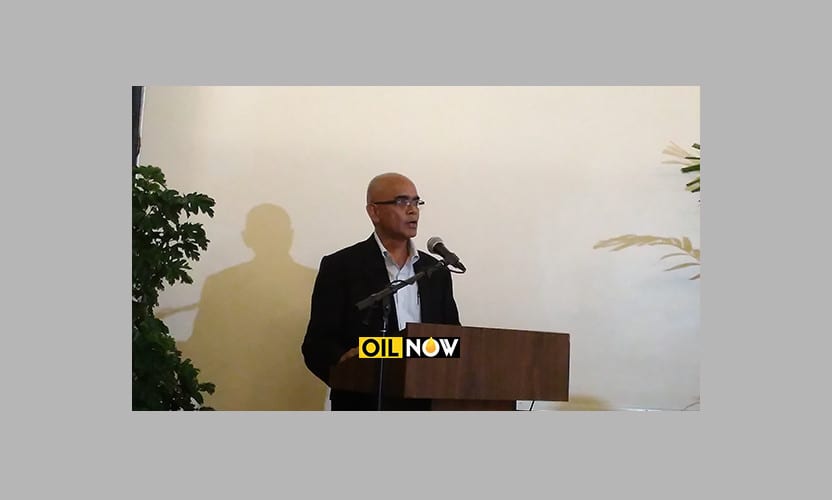Guyana is being urged to use revenue that will be earned from oil production to fund the realization of its ‘Green State Development Strategy’ as part of the diversification of the country’s economic base, in order to avoid having to be dependent on the export of singular commodities.
This is the view held by Dr. David Singh, Director of Conservation International (CI), a non-Governmental Organization (NGO) which in part targets sustainable development of natural resources and the protection of biodiversity among other ideals.
Dr. Singh was at the time speaking with OilNOW on the sidelines of a public lecture – sponsored in part by CI – at the Guyana Pegasus on Wednesday, on ‘Securing our future in a Sustainable Economy.’
Dr. Singh said the revenues from the oil and gas sector must be used to support the transition to a green economy – an economy that is diversified and built on sustainable policies.
“When you look at Guyana’s economy even in colonial periods, it was always highly driven by commodities; so sugar, bauxite, gold….all of the products are really just primary commodities that we are exporting,” he said.
The CI Director further added, “What we see is that oil is another commodity, it is now entering the economic sector and really just as with other commodities, what do we do with these resource that we have and how do we manage that resource in a way that really addresses this concept of a green economy.”
He noted that a green economy is one that “builds human well-being, increases social equity, reduces environmental scarcities and ecological risks.”
Guyana as a country has signed onto a number of international climate related conventions including the COP21, Kyoto Protocol, Copenhagen Accord and the Paris Agreement among others.
The country has in recent years also begun pursuing a green economy; first under the ‘Low Carbon Development Strategy’ and at present under the ‘Green State Development Strategy’.
Dr. Singh told OilNOW, Conservation International is keenly interested in how the current administration, in pursuit of a green economy, “intends to take this new emerging sector, the revenues from this sector, and really use it to support the transition that must happen, to a green economy, to a sustainable economy.”
CI advocates, according to its Director, are exploring a vision beyond 2020 – when oil production is expected to begin commercial production for the first time in the country’s history.
According to Dr. Singh, “it’s not only about seeing the immediate, not only focusing on that, but 20-years from now, where will we be as a society.”
He was quick to remind too “oil revenues can fuel, more than ever, an unsustainable path, they call it the Dutch Disease…today we in Guyana have choices to make…how do we actually make this work to our advantage.”
The CI Director in giving that NGO’s take on the current preparations and source of concerns posed by the new industry, spoke to the need for strengthening of the country’s social capital as it relates to governance structures, since, “this could make or break a country.”
Dr. Singh has since concluded “if we don’t invest in that social capital and change the way in which we have developed that kind of cohesiveness within our society we will go the route of all countries that had booming oil industries.”
Speaking to environmental concerns, Dr. Singh told OilNOW the reasons the oil sector has generated such heated debate in Guyana, “is two-fold; one, it is an entirely new sector that is big and the second thing is there are so many unknowns about this, there are risks involved with it.”
He was quick to point out however that it should not be a case where Guyana’s oil revenues should not be exploited as a result of the risks involved.
According to the CI Director, “our view is that this should really help us to focus greater attention on how do we build the kind of capacity in our country to address environmental risks.”
He reminded that CI has long advocated the better resourcing of the Environmental Protection Agency, “ensuring the Petroleum Commission becomes well-structured and well-staffed moving forward very quickly.”



